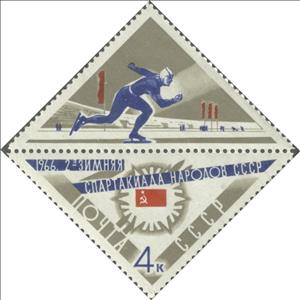Stamp: Emblem of Spartakiad Label. Ice skating. (Soviet Union, USSR 1966)
Emblem of Spartakiad Label. Ice skating. (Soviet Union, USSR 1966)
11 March (Soviet Union, USSR ) within release 2nd USSR Winter Spartakiad goes into circulation Stamp Emblem of Spartakiad Label. Ice skating. face value 4 Russian kopek
| Stamp Emblem of Spartakiad Label. Ice skating. in catalogues | |
|---|---|
| Michel: | Mi:SU 3193 |
Stamp is horizontal format.
Stamp Emblem of Spartakiad Label. Ice skating. it reflects the thematic directions:
Ice skating is the self-propulsion and gliding of a person across an ice surface, using metal-bladed ice skates. People skate for various reasons, including recreation (fun), exercise, competitive sports, and commuting. Ice skating may be performed on naturally frozen bodies of water, such as ponds, lakes, canals, and rivers, and on human-made ice surfaces both indoors and outdoors.
The Kionga Triangle (German: Kionga-Dreieck, Portuguese: Triângulo de Quionga) was a small region of German East Africa situated at the mouth of the Ruvuma River. The Ruvuma served as the border between the German colony and Portuguese Mozambique, and the Kionga Triangle was the only section of German East Africa south of the river. Its principal settlement was Kionga (now Quionga ) which had a population of 4,000 in 1910. It became a German possession in 1894 but came under Portuguese control in April 1916 during World War I. The post-war Treaty of Versailles reaffirmed that the river was the border between Tanganyika, then under British control, and Portuguese Mozambique. The triangle was the only territory that the treaty awarded to Portugal.

